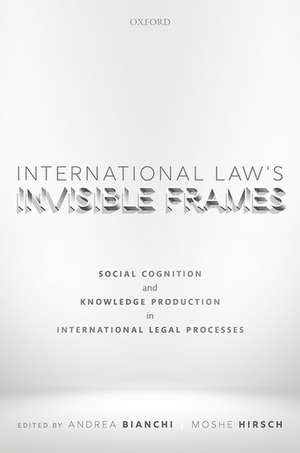International Law's Invisible Frames: Social Cognition and Knowledge Production in International Legal Processes
Editat de Andrea Bianchi, Moshe Hirschen Limba Engleză Hardback – 28 sep 2021
Preț: 595.04 lei
Preț vechi: 851.53 lei
-30% Nou
Puncte Express: 893
Preț estimativ în valută:
113.87€ • 118.16$ • 95.18£
113.87€ • 118.16$ • 95.18£
Carte disponibilă
Livrare economică 13-19 februarie
Livrare express 07-13 februarie pentru 138.25 lei
Preluare comenzi: 021 569.72.76
Specificații
ISBN-13: 9780192847539
ISBN-10: 0192847538
Pagini: 336
Dimensiuni: 162 x 240 x 24 mm
Greutate: 0.66 kg
Editura: OUP OXFORD
Colecția OUP Oxford
Locul publicării:Oxford, United Kingdom
ISBN-10: 0192847538
Pagini: 336
Dimensiuni: 162 x 240 x 24 mm
Greutate: 0.66 kg
Editura: OUP OXFORD
Colecția OUP Oxford
Locul publicării:Oxford, United Kingdom
Recenzii
The encounter and the confrontation that lie at the core of the book -or, if you prefer, the invisible frames that tie together these contributions by these international lawyers- constitute one of the most fascinating aspects of the book's hydrography.
Notă biografică
Andrea Bianchi is Full Professor of International Law at the Graduate Institute of International and Development Studies, Geneva. Previously, he was Full Professor at the Catholic University in Milan; Associate Professor at the University of Parma, and Professorial Lecturer at the Johns Hopkins SAIS Bologna Centre. His publications address topics that range from international legal theory and treaty interpretation, human rights and international humanitarian law, terrorism and counterterrorism, to the law of jurisdiction and jurisdictional immunities, state responsibility, non-state actors, and the law of treaties.Moshe Hirsch is the Von Hofmannsthal Chair in International Law at the Hebrew University of Jerusalem. He specializes in international economic law and international legal theory, with a particular emphasis on the sociology of international law. A significant part of his work involves interdisciplinary research that employs sociological theories, game theory, political economy, and international relations theory.
